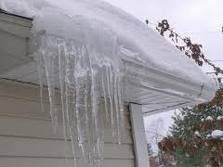Who Pays?
[Editor’s Note: Seller liability for ice dams and other home issues is case-specific, and affected by local and state law. For legal advice, please contact an attorney.]
What a difference a year makes!
 Last winter, beleaguered Twin Cities homeowners contended with record snow and cold — and (tens of?) thousands of havoc-wreaking ice dams. See, “Bumper Year for Twin Cities Ice Dams — and Ice Dam Contractors.”
Last winter, beleaguered Twin Cities homeowners contended with record snow and cold — and (tens of?) thousands of havoc-wreaking ice dams. See, “Bumper Year for Twin Cities Ice Dams — and Ice Dam Contractors.”
This year?
Relatively mild temps and below average snowfall means minimal snow cover and blissfully bare rooftops.
Unfortunately, that’s hardly the case in places like New York, Philadelphia, and even Washington, D.C., all of which received over 20″(!) in just one storm last month.
Can recent home Buyers in one of those markets dealing with ice dams this winter look to their Sellers to absorb some — or all — of the expense?
Legal Standard
At least in Minnesota, there is a two-pronged legal standard for recovery: 1) the problem had to exist before the  Buyer purchased the home; and 2) the Seller had to know — or should have known — about the problem.
Buyer purchased the home; and 2) the Seller had to know — or should have known — about the problem.
So, a home buyer who closed on a balmy day last Fall . . . flunks test #1, never mind about #2.
But what if the home historically suffered from ice dams, and this year’s are simply the latest recurrence?
Usually, there’s residual evidence that a home previously had ice dams, even after the damage has been repaired.
Plus, a good home inspector will note the roof’s pitch and design, following any roof valleys to the home’s interior ceiling(s) to look for signs of past leaking (stains, fresh paint, etc.).
Seller Disclosure
Of course, Minnesota law also requires that Home Sellers tell prospective Buyers if they’ve previously had ice dams — or any other roof damage — in state-mandated disclosure forms.
Misrepresenting such material information not only risks liability for fraud (and its open-ended statute of  limitations), but isn’t likely to fool a Buyer who does their due diligence.
limitations), but isn’t likely to fool a Buyer who does their due diligence.
For all those reasons, it’s likely that either a home hasn’t previously had ice dams — or, if it did, the issue was identified and dealt with prior to closing.
Bottom line?
Just like Buyers usually can’t recover from Sellers when, post-closing, they get water in their basement after a rare, torrential rain, it’s unlikely that they have recourse for ice dams following record-setting 2016 snowfall.
Fortunately, most homeowners’ insurance policies cover ice dam-related roof damage, subject to a deductible.
See also, “Anyone Know a Good Ice Dam Removal Company?“; “Detecting an (Early) Ice Dam in December”; “Ice Dam First Aid“; and “The “N’ is Silent.”
